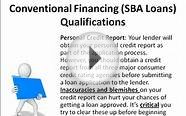
Money is a big worry when you’re starting a small business. It’s an even bigger headache when you have bad credit.
With the growth of alternative lending, established businesses with bad credit have options for small-business loans. Startups with poor credit, however, face higher hurdles to financing. But loans are attainable if you know where to look.
Here are six financing options for startup business loans for those with bad credit.
Microloans and loans from nonprofits
Microlenders and nonprofit lenders are two of your best financing options if you have bad credit and are looking for small-business startup loans. Generally, you’ll get solid loan terms from these lenders, making it possible for you to grow your business and establish better credit.
Many microlenders and nonprofit lenders are also focused on helping minority or traditionally disadvantaged small-business owners, as well as small businesses in communities that are struggling economically. And these organizations are willing to work with aspiring entrepreneurs with poor credit.
The U.S. Small Business Administration also has a microloan program that offers loans of up to $50, 000 to small businesses and some not-for-profit childcare centers. The average SBA microloan is about $13, 000. Here is a list of providers.
Friends and family
Perhaps the most common way of financing a new small business is to borrow money from friends or family. Of course, if your credit is bad — and your family and friends know it — you’ll have to persuade would-be lenders that you’ll be able to pay them back.
In these situations, the potential cost of failure is not just financial but also personal.
“Business is personal regardless of what people say, ” David Nilssen, CEO of small-business financing company Guidant Financial, tells NerdWallet. “For most people, it’d be difficult to separate the two.”
Trim your list of friends and family to just those who understand your plans, and do your best to make certain they are comfortable with the risks involved.
Credit cards
Many small-business owners use a credit card to start a small business. Having bad credit doesn’t preclude getting one, although your choices may be limited to secured credit cards.
It’s important to remember, however, that credit cards are an expensive way of financing a small business if you have bad credit. That’s because card issuers determine annual percentage rates based largely on your personal credit score. It’s OK to use them to get started, especially if your credit is not good enough for a bank loan or other forms of financing. But research has shown that small businesses that rely too heavily on credit card financing typically fail.
Personal loans
Many new small-business owners also access financing through personal loans, especially through a growing number of online lenders. But like credit cards, personal loans usually have high APRs, especially for bad credit borrowers.
For example, you could get a personal loan that could be used for starting a business from companies such as Peerform and Vouch. Both lenders have a minimum credit score requirement of 600, but their loans have APRs as high as 30 percent.
Nilssen says small-business owners should consider personal loans “an option of last resort.”
“Where they can work, ” he says, “is when a business just needs a small amount of money for things like vehicle wraps, early stage production or buying equipment.”
Crowdfunding
Crowdfunding has become a popular method of raising funds to start a small business, thanks to such sites as Kickstarter and Indiegogo, which let you launch online campaigns to solicit funds. Instead of paying back your donors, you give them gifts, which is why this system is also called rewards crowdfunding.
New avenues are also opening up for equity crowdfunding, in which you tap a public pool of investors who agree to finance your small business in exchange for equity ownership. This became an even broader option recently with new securities regulations that allowed small-business owners to reach out to mom-and-pop investors, not just accredited investors.
Crowdfunding is good for the entrepreneur “who has a product and wants to test the market and validate the opportunity, ” Nilssen says. “No credit necessary.”
Grants
Grants from private foundations and government agencies are also a way to raise startup funds for your small business. They’re not always easy to get, but free capital may be worth the hard work for some new businesses.
Interesting facts
Additional information







|
Realism Board Game Toy (Realism Games Ltd)
|








